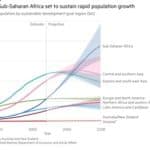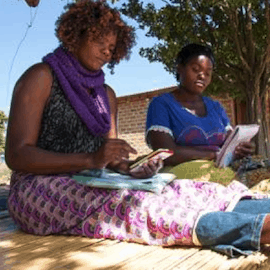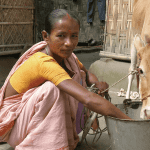Lessons in Resilience: What an Impact Investor Learned from an Entrepreneur Who Refused to Give Up
Entrepreneurship is a long game, and identifying the right product, service, model or market is just the beginning of the process. Even if you have a great product and a promising market, success is never guaranteed. How many times will you get knocked out of the saddle and climb right back in? Will you give up after the second, third or even fourth blow?
With all the challenges and uncertainty of running a business, winning often comes down to grit.
For Arindam Dasgupta, co-founder and CEO of Tamul Plates in India, quitting was never an option. Through long, anxious and draining days and nights, he persisted. Neither a global pandemic, the loss of loved ones, repeated catastrophic floods in his operational areas, an unprecedented national demonetization that wiped out his company’s cash stores, nor the depletion of his personal finances could shake his commitment. For over a decade he fought to keep his business alive because, simply, he believed.
And he was right.
As of October 2022, the company was reporting annual revenue of INR 2.14 crore (approximately US $268,000), with 60% of its sales coming from the export market. And last November, Tamul closed on a follow-on investment of INR 4.5 crore (US $563,000) from a Mumbai-based investor.
“This investment will help Tamul to grow from an INR 2 crore company to a 50 crore (US $6.3 million) company in the next five years,” Dasgupta says. “We are also in the process of buying an industrial plot 40 km from our current location, [and] plan to set up a world-class production and packaging facility.”
What makes him happiest is the company’s recent decision to increase staff salaries by 30%. It is validation of the vision he has for his business, his community and the planet — a vision that kept him going during the challenges of recent years. “For the first time since the pandemic,” he says, “people around me are really smiling.”
As an early investor in Tamul Plates, Upaya Social Ventures has watched Dasgupta and his team navigate both the pandemic and other difficulties — and their approach has highlighted several qualities and practices that investors like us look for when assessing potential portfolio companies. Below, we’ll discuss how Tamul has managed to thrive in the face of adversity, and what we’ve learned from our efforts to support it throughout these challenges.
The Characteristics of a Resilient Entrepreneur
Founded in 2010, Tamul manufactures environmentally-friendly, biodegradable tableware made from the thick sheaths of the leaves of local areca nut trees. The company is based in the Barpeta District of the state of Assam, in the sleepy northeast corner of India, and it has a stated commitment to employ rural households, with a focus on women and youth — as a result, many of its workers are from indigenous tribal communities. For most of its workers who come from this underemployed population, Tamul is the first formal job they have ever held. They collect leaf sheaths, wash and dry them, shape them into different plates and bowls using mechanical presses, and package and market the products.
In Tamul’s early years, Dasgupta and his two co-founders bootstrapped the company, starting with one mechanical press made with the help of a Kolkata-based small machine manufacturer. The team sold their plates locally, and used the proceeds to procure more machinery and expand their workforce.
But when they approached investors — even impact investors — they were rebuffed by most. Investing in a rural, low-tech operation seemed like a high-risk/low-return prospect.
However, for Upaya Social Ventures, which invests with a mission to help create dignified jobs for the poorest of the poor, the impact potential of Tamul was clear. In 2015, together with Artha Impact, we committed INR 48 lakhs (approximately US $75,000 at the time) to help grow the business.
Back then, our initial investment flouted the standards of acceptable risk that were typical among impact investors. In those days, Upaya’s Pioneer Capital strategy of investing in early-stage (often unproven) concepts and entrepreneurs was still seen as a novelty in the sector. But Tamul’s business fundamentals were solid. The process for building the presses that Dasgupta had created was scalable, and the supply chain matched well with a local economy dominated by small family farms. And most of all, the effort was driven by an entrepreneur who believed in the work and threw himself into every aspect of the business.
This is not hyperbole: When the Upaya team first visited the company in Barpeta that year, we went house-to-house in the villages and spoke to people who were all part of the Tamul production process. At every stop, Dasgupta was walking the fields with farmers who were collecting the areca nut sheaths, to better understand how to improve the collection and cleaning of the raw material — or quizzing the young men working the presses on proper processes and maintenance.
Of course, in many of these conversations, it seemed everyone was happy to share their opinions on how Dasgupta could run his business better. But what stood out to the Upaya team was how he took the time to really listen to them, suspend judgment, and not just hear what they were saying but understand why the issues they were describing had emerged. He insisted on learning the details, because they informed the optimal design of the machines, shop floor processes and incentive structure for the company’s employees. Dasgupta paid the same attention to his customers, many of whom lived in large cities like Kolkata and Delhi, listening to why they had purchased Tamul products and bringing their design ideas back to Barpeta to incorporate into the next product cycle. These details mattered more and more as Tamul scaled, and this feedback ensured that the enterprise could sustain its product quality and customer following.
Investors like to say, “bet on the jockey, not the horse.” It can be challenging, however, to determine exactly what characteristics an investor should look for in an entrepreneur during due diligence. Dasgupta set a standard for the type of founder that we at Upaya looked for in subsequent deals: leaders with deep and authentic ties to their clients, workers and communities, and an obsession with the details of their craft.
As it turned out, this foundation created a resilience in Dasgupta and earned him the trust of his employees — both of which were vital for navigating the series of once-in-a-lifetime challenges to come.
Leadership in Unprecedented Times
Tamul made it through several near-death crises — including in 2016 (demonetization) and 2018 (floods) — but the COVID-19 pandemic brought the operation to the brink of permanent closure. The first wave and ensuing lockdown in 2020 halted all production for several months, but with an emergency loan from Upaya and a creative crowdfunding campaign, the company survived and started the slow process of rebuilding.
Then 2021 brought with it the much deadlier Delta wave, and this time the consequences were far more severe. Dasgupta lost loved ones to the virus. Even as he struggled to make funeral arrangements, one by one Tamul’s clients rescinded their orders. Delivery channels, ground transport and shipping routes came to a halt. Large gatherings were banned, and demand for Tamul’s products vanished.
For months, the enterprise was in limbo. By late summer of 2021, its factories sat empty and many workers had left to look for work elsewhere. In a conversation with the Upaya team, Dasgupta admitted that a shutdown was imminent — though he could barely bring himself to utter those words. As a last-ditch effort, Upaya and Dasgupta managed to line up a fellowship that would give him a chance to resurrect Tamul.
Thankfully, these efforts worked. One year later, Tamul is profitable, has surpassed its revenue goals, and has reinstated over 3,000 jobs in the community. “Every impact investor hopes to find an entrepreneur with grit like this,” said A B Chakravarthy, Upaya’s India Country Director, who worked closely with Dasgupta on the turnaround. “Against all odds, he never gave up.”
Looking back on our work with Tamul Plates through these turbulent years, a critical lesson emerges that may resonate with other impact investors: All entrepreneurs must deal with constant adversity, and many of these challenges are significantly amplified in emerging markets. In these contexts, the skill and determination of the entrepreneur often makes the difference between success and failure. For investors working in these markets, it’s essential to take the time to get to know the entrepreneurs in your portfolio, to understand their strengths and unique needs, and to provide support that can help maximize their potential. By combining this support with the grit and commitment of an entrepreneur like Arindam Dasgupta, we can build businesses that can weather even the harshest of circumstances.
Sachi Shenoy is the founder of Calidris and a co-founder of Upaya Social Ventures. Steve Schwartz is a Fellow with the World Economic Forum and a co-founder of Upaya Social Ventures.
Photo courtesy of Upaya Social Ventures.
- Categories
- Investing, Social Enterprise



